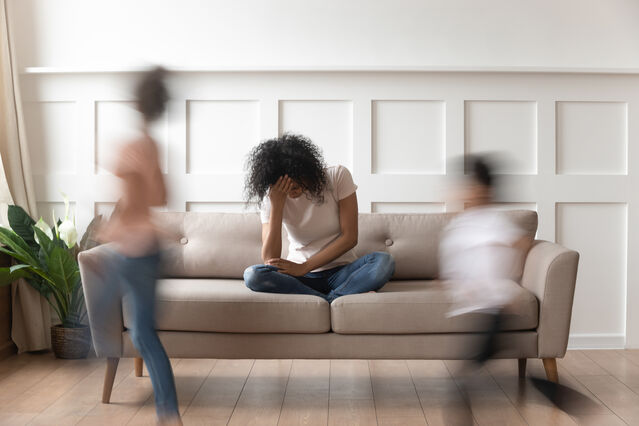Health
Mothers' Mental Health Is in Crisis Due to the COVID-19 Pandemic
The American gender gap has widened for moms experiencing higher stress levels.
Posted May 16, 2021 Reviewed by Jessica Schrader
Key points
- COVID-19 research has exposed mental health risks for American mothers.
- A recent pandemic poll mirrored the anxieties and sense of unfair burdens that moms share during therapy sessions.
- Women of color can be reluctant to process the trauma of the Breonna Taylor and George Floyd murders with their white partners and therapists.

With the many cracks in American society exposed and widened during this pandemic, the least addressed by policy or economic legislation thus far has been the mental health impacting mothers.
The majority of moms added a “fourth shift” of academic organizer to their pre-COVID-19 working shifts, which already included: financial provider (for those that worked outside the home), partner (if they indeed had a partner), and that of homemaker taking care of what philosopher Sara Ruddick termed “maternal thinking”; the organizing, planning, anticipating, and worrying for the entire family.
What the Statistics Tell Us
A survey done by A Morning Consult and published by the New York Times found that 80% of mothers reported they were spending more time on homeschool than their spouse. The Times has reported in their special report on "Moms in Crisis" that 32% of women who left the workplace ages 25-44 stated that child care was the reason for their current unemployment, while 48% of Black mothers stated that the pandemic impacted their ability to pay for basics like food, housing, and utilities.
And according to the Kaiser Family Foundation's Tracking Poll conducted last summer, more than two-thirds of mothers (69%) mothers say they’ve experienced any of the following adverse health effects over the previous two months compared to half of fathers (51%):
According to an American Psychology Association survey, “nearly half of mothers who still have children home for remote learning (47%) reported their mental health has worsened; 30% of fathers who still have children home said the same."

Now these statistics may not fully capture the fact that fathers usually under-report their own mental health concerns, and that single moms never got a chance to get a break from all these pressures due to lockdown restrictions and being too frightened to expose their own parents or older relatives to COVID-19. Given that BIPOC and Latinx, American Indian, or Alaska Native Americans were more severely impacted by the COVID-19 pandemic with higher numbers of deaths, mothers from these communities were even more likely to also be contending with the mental health trauma of the loss of loved ones.
Clinical Observations of Mothers' Experiences During Past Year of Pandemic
Given that we are focusing this month on the ways the COVID-19 pandemic has affected all Americans’ Mental Health Awareness, I would like to focus in on the daily needs of mothers who have carried the majority of family care and still need societal structural changes to support them, and by extension American families, now that we are beginning to see a light at the end of the COVID-19 pandemic tunnel. At the time of the writing of this post, CDC has just announced their new guidelines regarding the option of not wearing masks when in most indoor settings for people who are fully vaccinated.
During these past 14 months, I’ve witnessed, through the lives of my practice’s clients, how mothers at all different life stages of motherhood have been managing the increased burdens of household responsibilities due to the COVID-19 pandemic. Many had originally started therapy to address issues like their lower sexual desire, discrepant desire from their husband/partner, difficulty in expressing their emotional needs, or perhaps to repair a relationship that had been torn apart by a husband/partner’s breaking of their monogamy agreement. While some couples were able to work on these goals, the daily frustrations, conflicts, and challenges of COVID-19 became more urgent since it caused tremendous dysregulation among these parents and their children. Whether it was a child with special needs who couldn’t follow their virtual lessons, a child who needed an activity planned for any time not scheduled by online school, or a child who was overwhelmed by COVID anxiety around their parents’ or grandparents’ potential risk of illness or death, each mother was faced with unending specific challenges.
Racial Inequity Amidst the COVID-19 Pandemic
In my group practice, some of the therapists (who are white, brown, and Black) have also witnessed how moms were impacted by the second wave of Black Lives Matter organizing to protest racial injustice after the murders of Breonna Taylor and George Floyd. Moms of color became more triggered when their husbands expressed anger in public, fearful they might be putting themselves in danger while also setting an example for their children, who were at increased risk of racial profiling and potential police violence as they got older.
We have also seen Black or brown mothers partnered with white spouses who let them know they didn’t want to process these traumatic experiences in session or outside of sessions while the protests were still going on.
These moms explained to their partners that they were past their limit, as it was, with all the responsibilities on their shoulders each day and were actually looking for more concrete help from their white partners. Their white partners were surprised when their expressions of mournful solidarity were quickly shut down by their partners/spouses of color, leaving them feeling a mixture of guilt, frustration, anger, and powerlessness. The violence of these deaths is a long-running fear Black and brown mothers carry each day of their lives. What the BLM movement resurgence added by exposing these traumatic deaths via video footage to the public was a triggering of traumatic response and a deep sense of communal and personal pain to what had become an already beleaguered burden of responsibilities threatening their delicate mental health balance. Their demand for compartmentalization was a survival skill during the worst pandemic crisis in a century. They wanted to pace their processing in their own time.
Mothers' Reproductive, Sexual, and Mental Health During the Pandemic
There was also a heart-rending situation told by a father who was doing his best to support his wife as she underwent a pregnancy loss and a follow-up surgical procedure. She had to go through both these experiences on her own due to COVID restrictions in the hospital. This mother was privileged to have health insurance coverage and a virtual job that allowed her to take sick days. However, the time to mourn the loss of a pregnancy was not fully available to her due to the loss of child care and the isolation from friends. While New York Governor Andrew Cuomo had to issue an executive order to force hospitals to allow in one birth partner during labor at the height of COVID, this mom’s reproductive emergencies were done alone, separated from her husband.

Most mothers have been carrying the load of domestic work for generations and while studies have shown gradual increases among men’s participation in heterosexual marriages in the last decade, the research as recent as 2015 drives the gender gap home showing that women do more than two hours of additional work per day compared to an additional 40 minutes for men. Many mothers in my practice have mourned the loss of their friendship groups who they relied on for kinship support when they’d feel isolated. While Zoom filled in for family and social outlets, many moms said they would just collapse at the end of their days after having been stretched to the maximum limits of their bandwidth having worn more hats than they ever had to.
Some of these mothers expressed resentment at having to be overseeing so much of their children’s education, a sense of isolation from their colleagues at former jobs, longing for time to exercise, and physical fatigue due to the many household jobs. Many of these feelings would contribute to erotic apathy in their relationships. For other women, the experience of not having any time away from their spouse made them feel more like a roommate to their partner, eroding the erotic or romantic space described by Esther Perel in the same-titled book as “mating in captivity.” In pre-COVID times couples would have time to fuel their sexual desire through date nights, socializing with friends, or leisure time spent apart due to their or their partner’s/spouse’s work schedule. Longing to have private time in one’s home without a spouse or child intruding or asking for something was a frequent fantasy expressed in sessions during the pandemic.
Recommendations for Post-COVID Societal Changes Addressing Mothers' Mental Health
Just as the federal government established stricter financial guidelines for banks and continue to administer “stress tests” in the aftermath of the financial crisis 2008/2009, it is this therapist’s hope that there will be investments made in resources for mothers going forward that include:
- Easily accessible mental health care
- Online maternal support groups
- Wage parity for women in all jobs
- Reasonably priced or free child care for mothers
- Access to all forms of sexual and reproductive health care (including access to abortions)
- Community parenting crisis counselors to aid single mothers who need breaks
- A larger investment in concrete maternal supports in BIPOC, Latino, and First Nation communities
References
Ruddick, Sara (1989). Maternal Thinking: Towards a Politics of Peace. The Women's Press.
Almeida, M., Shrestha, A. D., Stojanac, D., & Miller, L. J. (2020). The impact of the COVID-19 pandemic on women's mental health. Archives of women's mental health, 23(6), 741–748. https://doi.org/10.1007/s00737-020-01092-2
Yavorsky, J.E., Kamp Dush, C.M. and Schoppe‐Sullivan, S.J. (2015), The Production of Inequality: The Gender Division of Labor Across the Transition to Parenthood. Fam Relat, 77: 662-679




